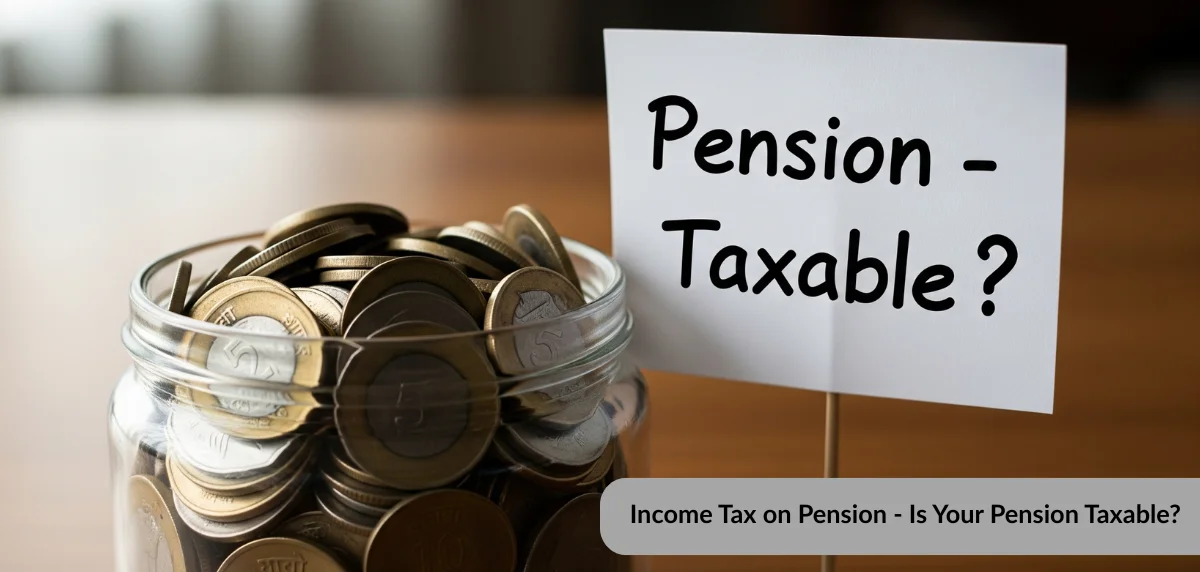Retirement brings freedom from work, but not from financial responsibilities. That is why many people rely on pension plans to generate a monthly income after retirement. But a common question that arises is: Is the income that I receive as a pension, taxable? The answer depends on the type of pension and the source of the income. Let’s break down the taxability of pensions and explore other related aspects.
Understanding Pensions and Their Taxability
The short answer is: Yes, pension income is taxable in India.
According to the Income Tax Act, pensions received from an employer after retirement are taxed under the head ‘Income from Salaries’. This includes regular monthly pensions as well as any advance or lump sum payments.
When exploring whether pension income is taxable, it is important to note the exceptions. Government employees receiving lump sum pensions may be eligible for exemptions. Similarly, certain exemptions also apply to non-government employees based on how the pension is received.
There are two types of pensions based on how one chooses to receive their pension:
Commuted Pension
This is the lump sum amount you receive at retirement. For example, if you choose to receive 30% of your total pension in advance, that amount is your commuted pension.
Uncommuted Pension
This refers to regular pension payments received every month. This can be the main source of monthly income after retirement.
Example:
Ms. Vidhi retires at the age of 58, from which point onwards the vesting age of her pension plan begins. Her monthly pension is set at ₹15,000. She decides to commute 20% of her pension for the next 12 years and take it as a lump sum at retirement.
To calculate the commuted pension:
20% of ₹15,000 = ₹3,000
₹3,000 × 12 months × 12 years = ₹4,32,000
So, ₹4,32,000 is paid to Ms. Vidhi as a commuted pension upfront.
She will then receive ₹12,000 per month as uncommuted pension for the next 12 years, until she turns 70. After age 70, she will start receiving the full ₹15,000 per month again.
Taxability of Commuted and Uncommuted Pension**
The income tax on pension depends on whether it is commuted or uncommuted:
Uncommuted Pension
This is considered fully taxable as ‘Income from Salary’. It applies to both government and non-government employees. For instance, the ₹12,000 received by Ms. Vidisha is fully taxable, as well as the ₹15,000 she will receive after crossing 70 years.
Commuted Pension
If you are a government employee, your commuted pension is fully exempt from tax.
For non-government employees, the rules differ:
- If they also receive gratuity: 1/3rd of the commuted amount is tax-free, while the rest is taxable.
- If no gratuity is received: 1/2 of the commuted pension is exempt from tax.
These exemptions for pension plans apply under both the old and new tax regimes.
Taxation on Pension Received by Family Members**
In the unfortunate event of a retiree’s demise, the pension may be passed on to their spouse or children. This pension is taxable under ‘Income from Other Sources’.
Family members can claim an exemption up to ₹25,000 or 1/3rd of the uncommuted pension received – whichever is lower. This limit was increased from ₹15,000 starting FY 2024–25.
Commuted family pension, if paid as a lump sum, may be fully exempt depending on the case in question.
Is Life Insurance Pension Taxable?**
Many people opt for pension plans through life insurance companies.
In such cases:
- The pension payouts (annuity income) received once the vesting age begins are fully taxable as per the individual’s income slab.
- However, premiums paid towards the plan may be claimed as a deduction under Section 80C (up to ₹1.5 lakh per year).
So, is pension taxable from insurance companies? Yes. But you do get some tax relief during the accumulation phase.
Planning wisely for your golden years with a smart retirement plan is crucial, as it can help you reduce your tax outgo and make your golden years financially secure.
Tax Planning Tips for Pensioners
If you are planning for retirement, here are a few things to keep in mind:
- Choose a mix of commuted and uncommuted pension. Calculate the extent to which your uncommuted pension will be taxable. Also, plan for situations in which your family will be receiving the pension in your absence and the taxation they will have to deal with.
- Use a pension plan calculator to estimate how much income you will need after retirement.
- Consider contributing to government-backed savings options, such as the Senior Citizen Saving Scheme or National Pension Scheme, which come with considerable tax benefits and good returns.
- Consult a tax advisor or financial planner to help you decide which pension plan for self-employed or salaried individuals works best for you.
Pensions are a vital part of your financial life after retirement, but it is important to know that income tax on pensions may apply in most cases. Whether you are receiving it monthly or as a lump sum, planning ahead can help avoid surprises in the long run.
** Tax exemptions are as per applicable tax laws from time to time.
























